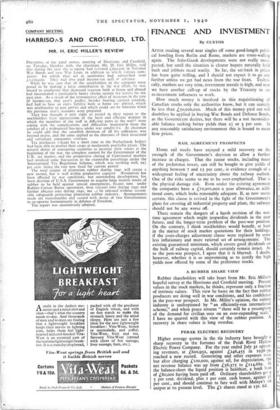COMPANY :METING
HARRISOAS AND CROSFIELD, LTD.
MR. H. ERIC MILLER'S REVIEW
PRESIDING at the 32nd annua. meeting of Harrisons and Crosfield, on Tuesday, October 29th, the chairman, Mr. H. Eric Miller, said that during the year the cc :npany had it.vested £200,000 in National War Bonds and new War Loan, in addition to which various com- panies for which they act as secretaries had subscribed over ki,000,000. They had also paid income-tax well in advance.
While he was sure that all the stockholders in the company were proud to be making a large contribution to :he war effort, he was bound to emphasize that increased taxation both at home and abroad had necessitated a particularly heavy charge against the profits fox the past year. As a result of the retrospective effect of increases in the rate of income-tax, that year's profits, besides bearing current taxation, had had to bear an extra liability both at home anc' abroad, which was attributable to past profits and which could .tot be foreseen when the previous year's .accounts were prepared. They had thought it only right to record in their report to the stockholders their appreciation of the loyal and efficient manner in which the members of the staff in diffc.rent parts of the worl-i were coping with the complications and difficulties inseparable from the conduct of a widespread business under war conditi Ins. As chairman he could add that the unselfish devotion of all his colleagues was beyond praise, and the same applied to the directors of their associated and subsidiary companies overseas. Tea producers (except for a short time in the Netherlands Indies) had been able to market their crops at moderately profitable prices. The natural desire of consuming countries to increase their stocks at the beginning of the war, the complete control by the Government of the U.K. tea market, and the progressive closing of Continental markets had involved some fluctuation in the exportable percentage under the International Tea Regulation Scheme, which was working well, 92+ per cent. bein4 the rate now fixed for current period
The total output of plantation rubber during 194c will create a new record, but is well within productive capacity. Absorption has been affected by war conditions, but outstanding development has been decision of U.S.A. Government to acquire large reserve stocks of rubber to be held against special emergencies, 85,00o tons under Rubber-Cotton Barter agreement, then 15o,000 tons during 1940 and further 18o,000 tons during 1941, not a be released without reason. able safeguards protecting plantation rubber industry. Arrangements made are statesmanlike and accord with desire of two Governments to co-operate harmoniously in defence of Freedom.
The report was unanimously adopted.






































 Previous page
Previous page